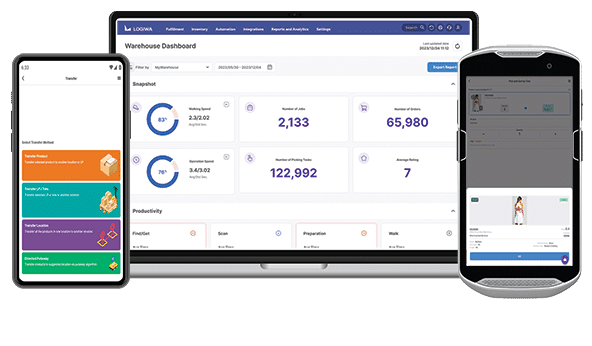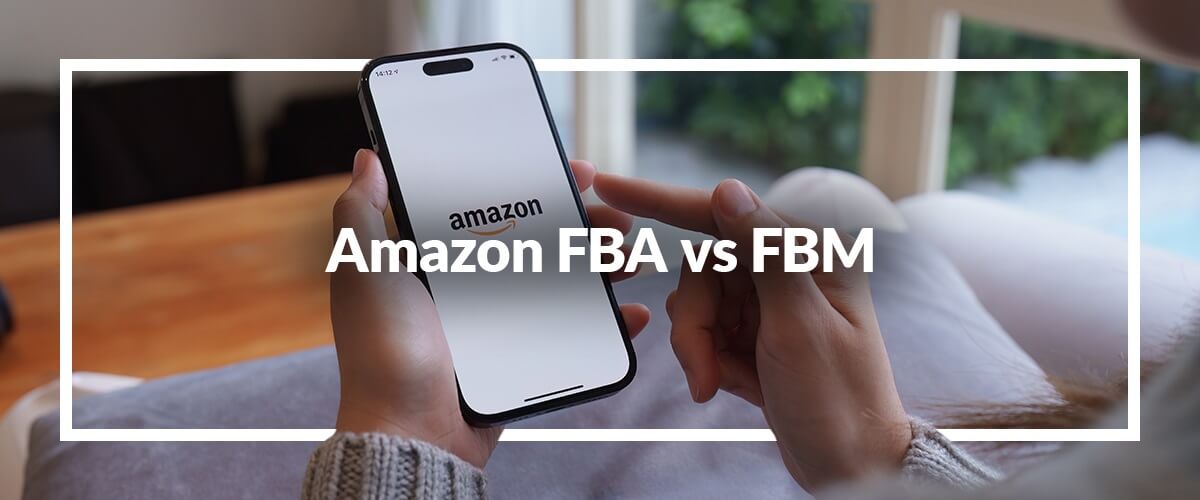In this article, we will define FBA and FBM, weigh the pros and cons of each and offer insights into choosing the best option for your ecommerce business.
Contents
Key Takeaways
- Fulfillment by Amazon (FBA) offers a way to outsource item storage and order fulfillment to Amazon; Fulfillment by Merchant (FBM) means being in charge of your own logistics.
- FBA offers access to Amazon’s fulfillment network, reduced shipping costs, Prime eligibility, and Buy Box advantage; however, it comes with added cost and limited control.
- FBM provides autonomy, cost-efficiency and adaptability for specific products and branding initiatives; but risks competitive disadvantages and logistical challenges.
- FBA promotes rapid scaling and competitive results, while FBM offers control, customization, and cost-effectiveness, catering to niche business needs.
- It is possible to strategically employ FBA for small, high-demand items and FBM for specialized products.
FBA vs FBM: Differentiating Between Amazon Fulfillment Methods
Fulfillment by Amazon (FBA) and Fulfillment by Merchant (FBM) are two fulfillment method options offered by Amazon. Both offer a number of benefits depending on the level of control you wish to have over your operations.
Fulfillment by Amazon (FBA) represents the pinnacle of convenience for online sellers. When you opt for FBA, you’re outsourcing the entire fulfillment process to Amazon. Your products are stored in Amazon’s vast network of warehouses where Amazon can execute picking, packing and shipping processes on your behalf. As part of your monthly subscription, Amazon handles your customer service and returns management needs as well.
Fulfillment by Merchant (FBM) places the onus of order fulfillment squarely on the shoulders of the online seller. It allows you to retain total control over your inventory, warehousing, and shipping processes. When an order is placed, you or your designated third-party logistics (3PL) partner handles the picking, packing and shipping of orders directly to customers. FBM offers greater flexibility and control, allowing you to personalize your packaging, shipping methods and even customer service experiences.
Key Differences Between Amazon FBA vs FBM
While FBA and FBM have the same end-destination, they represent two significantly different paths for getting orders to customers. Which one you choose will depend heavily on your existing infrastructure, business goals and the type of items you sell.
FBA prioritizes convenience. When used correctly, it offers a hassle-free experience that entrusts your storage, packaging, shipping and returns with Amazon. This hands-off approach to logistics and customer service allows you to focus on sourcing quality products and marketing your listings while benefiting from Amazon’s extensive fulfillment network and competitive resources. This option includes a variety of monthly account fees related to inventory storage, sales, fulfillment processes, returns and more.
FBM, on the other hand, prioritizes control. It puts you in the driver’s seat, granting you absolute authority over your inventory management, order fulfillment and customer interactions. This approach is particularly appealing if you are already managing cost-effective logistics or unique, fragile or oversized items that do not fit well within the standardized FBA system. It is also a great option if you are concerned with personalizing your packaging or adding marketing-related items to your deliveries. With FBM, you store and ship items yourself or partner with a cost-effective 3PL to avoid FBA costs.

Pros and Cons: Amazon FBA vs FBM
Participating in FBA and FBM, or combining both methods, can have significant ramifications for your ecommerce business without a holistic understanding of both services. Below is an overview of the primary pros and cons for each.
Pros and Cons of Amazon FBA
- Industry-Leading Fulfillment Logistics: With FBA, you gain access to Amazon’s vast network of fulfillment centers, which are strategically located for efficient and fast order processing. This can help you achieve competitive fulfillment standards (i.e. next-day shipping), scale quickly and expand your business to global markets without having to manage complexities of international shipping and customs regulations.
- Access to Advanced Technology and Strategic Partnerships: Amazon’s cutting-edge technology for order management, inventory tracking and real-time analytics can help you streamline your operations to enhance fulfillment results and customer satisfaction. Moreover, Amazon’s partnerships with top shipping carriers help you maximize cost-efficiency, reduce transit times and ensure reliable delivery services.
- Reduced Shipping Costs and Prime Shipping Eligibility: Amazon’s bulk shipping rates and negotiated carrier discounts can reduce your overall shipping costs, which is particularly advantageous for high-volume sellers. FBA also qualifies you for Amazon Prime’s coveted two-day shipping without added costs. This makes your products accessible to millions of Prime members and promotes product visibility and potential sales.
- Higher Chance of Winning the Buy Box: Products fulfilled directly by Amazon are more likely to secure the Buy Box, meaning online shoppers see that Amazon deems your product as a best deal when browsing. This boosts your product exposure and increases the likelihood of sales, as Amazon (and Amazon shoppers) tend to favor FBA sellers due to their reliable and fast shipping capabilities.
- Multi-Channel Merchant (MCF) Program: With FBA, you can utilize other sales channels beyond Amazon using the MCF program. This allows you to fulfill orders that are made on other platforms using Amazon’s fulfillment services, creating a unified and efficient fulfillment process.
When it comes to the disadvantages of using FBA, three things come to mind:
- Cost (including unpredictable fees)
- Lack of control over inventory and package personalization
- Strict shipping requirements for using the program
If you do not sell small, fast-selling items or lack the necessary resources to prepare FBA-compliant shipments the first time, you take on a variety of risks, including: added fees, shipments being rejected when they reach the Amazon warehouses and complications with quality control due to the inability to interact with your stock.
For more insights on FBA, its costs and package requirements, check out Logiwa’s blog, “A Guide to Amazon FBA – Is Fulfillment by Amazon Right for You?”
Pros and Cons of Amazon FBM
- Autonomy Over Inventory and Fulfillment Processes: When you oversee fulfillment yourself, you retain complete control over your inventory, allowing for strategic planning, personalized stock management and better adaptation to market demands without relying on Amazon’s algorithms. You are also able to choose your preferred shipping methods, packaging, and third-party logistics providers (3PLs), enabling tailored fulfillment that align with your business goals.
- Cost-Efficiency and Increased Savings: Amazon’s fulfillment fees, storage costs and numerous other expenses can be avoided if you take on logistics yourself. This leads to cost savings, especially if your business is equipped with an optimized logistics infrastructure or working with a top-tier 3PL.
- Avoid Unexpected Changes: When you are part of the FBA program, you are at the mercy of Amazon’s ecosystem and evolving seller rules. By overseeing your own fulfillment operations, you can dodge obstacles related to changing FBA processes, policies, and costs – all of which could impact your profits and operational stability.
- Enhanced Branding Opportunities: Implementing comprehensive branding strategies without limitations is a major benefit of FBM. It allows you to prioritize unique packaging, add in personalized marketing materials, and take other customer-centric actions that contribute to brand reputation and customer loyalty. You can also manage customer inquiries, feedback and returns directly, which can mean faster resolutions and a better brand image overall.
- Adaptability to Unique Products: FBM allows you to accommodate diverse product types, sizes, and fragility that might not align with FBA’s standardized processes, ensuring that specialized items reach customers intact and in optimal condition.
FBM allows you to scale your operations at your own pace, adapting to market fluctuations and business growth without the constraints of FBA’s predetermined pricing structures and fulfillment protocols. However, it does have certain drawbacks:
- Reduced competitiveness (i.e. less “Buy Box” power, logistics speed, etc.)
- Less chance of brand visibility on Amazon
- More hurdles to Amazon Prime (Seller Fulfilled Prime [SFP] allows you to participate in Prime Shipping but involves additional costs, qualifying periods and strict adherence to challenging shipping requirements)
There’s a reason that the majority of Amazon sellers use FBA or a combination of FBA and FBM: it simplifies logistics and guarantees key competitive advantages. That said, FBA is not one size fits all. That’s why it is key to examine your unique business characteristics before implementing either as part of your fulfillment strategy.
Choosing Between FBA or FBM
If you are aiming to scale rapidly and offer seamless, Prime-level customer experiences, FBA provides unmatched convenience. By outsourcing fulfillment to Amazon, you can concentrate on core business activities and rely on Amazon’s logistical expertise and robust infrastructure to help you reach a broader customer base and maximize brand growth.
However, FBA comes at a cost, which might not be feasible for your business, especially if your stock consists of large, slow-selling items. If that is the case, FBM provides an ideal alternative because it empowers control, customization and cost-efficiency.
If you are seeking to personalize your branding, quickly adapt stock based on consumer trends or lower your overall fulfillment costs, FBM may be the best option. It supports niche business needs that demand tailored fulfillment solutions. However, it also requires a robust logistics setup, which can lead to operational hurdles.
Check out Logiwa’s blog, “How to Use Amazon’s FBA Calculator” for insights on determining the potential costs, revenue and profit margins of selling on Amazon and using FBA services.
Warehouse Management Software that Supports Amazon Sellers
The choice between FBA and FBM boils down to your business goals, budget and the level of control you need over your operations. Regardless of which method you choose, Logiwa WMS was built to enhance fulfillment operations from one, centralized platform.
Our cloud fulfillment solution hosts a variety of Amazon integrations to support Amazon-related activities, including FBA management. Create shipment plans, download orders from your Amazon store, sync stock with your FBA inventory and connect directly with shipping carriers to get items to Amazon fulfillment centers on time. Learn more by reading, “For Amazon FBA Users, Logiwa is the Ideal Fulfillment Solution.”
FAQs Related to Amazon FBA vs FBM
What is the difference between Amazon FBA and FBM?
With Fulfillment by Amazon (FBA), your online business stores products in Amazon’s fulfillment centers and outsources logistics directly to Amazon. When a customer places an order, Amazon handles packing, shipping, returns and customer service on your behalf. Fulfillment by Merchant (FBM) means you are responsible for all fulfillment and customer service-related processes. This method gives you more control over your inventory and fulfillment process and is ideal if you have unique inventory and shipping requirements.
What are the advantages of using Amazon FBA and FBM?
FBA promotes competitive logistics like free Amazon Prime shipping, customer trust (i.e. higher chance of winning the Amazon Buy Box), and fast scalability. FBM allows cost control, customization and greater fulfillment flexibility, enhancing the unboxing experience and catering to unique shipping needs.
Can I use both Amazon FBA and FBM methods together?
Yes, you can use both FBA and FBM methods simultaneously. Multi-Channel Fulfillment (MCF) allows you to fulfill orders not only from your Amazon listings but also from other sales channels like their own website or other online marketplaces. Moreover, with careful inventory management, you can strategically employ FBA for high-demand items and FBM for specialized products, leading to optimized costs and customer satisfaction.
Run a fully digital warehouse with mobile apps, smart job batching, automation rules and robotics integrations
Warehouse Management
Modern digital WMS powers a modern fulfillment experience






